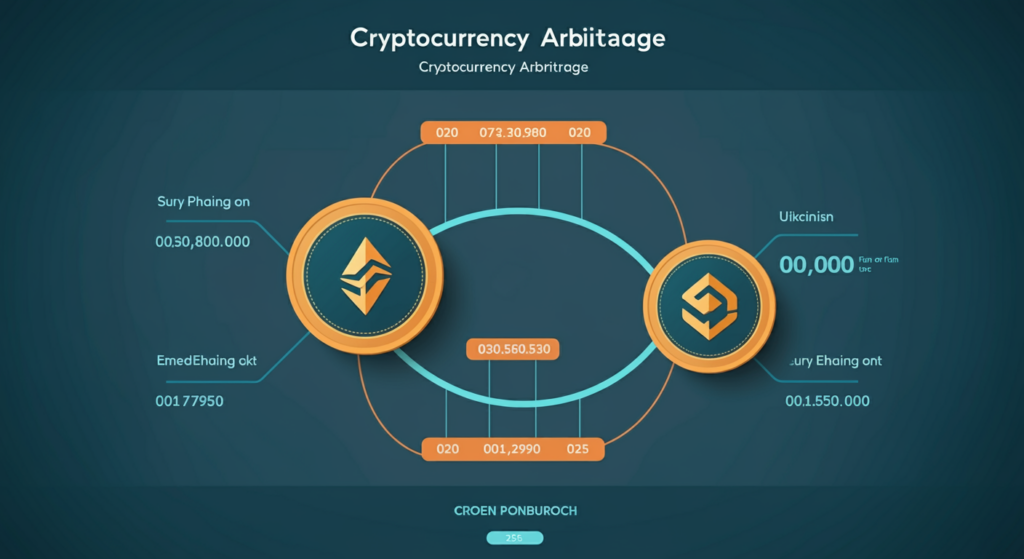
Cryptocurrency arbitrage presents an incredible opportunity for savvy traders, particularly in bustling markets like Nigeria, where crypto adoption is rapidly on the rise. This low-risk trading strategy allows you to take advantage of price discrepancies for the same cryptocurrency across various exchanges, making it an attractive option for those looking to generate consistent profits.
This guide aims to provide a constructive overview of cryptocurrency arbitrage, highlighting the reasons behind price discrepancies, and offering actionable steps to take advantage of these opportunities. Additionally, we will discuss the benefits, challenges, essential tools, and regulatory considerations relevant to Nigerian traders.
- Understanding Cryptocurrency Arbitrage

Cryptocurrency arbitrage is a powerful strategy that leverages price discrepancies of the same digital asset across different exchanges. Traders confidently purchase the cryptocurrency at a lower price on one platform and sell it at a higher price on another, capturing the profit from this inequality.
For example, if Bitcoin is listed at $40,000 on Exchange A and $40,500 on Exchange B, a smart trader can buy Bitcoin on Exchange A and sell it on Exchange B, potentially raking in $600 (after deducting fees) for each Bitcoin traded.
While the concept is straightforward, executing it successfully demands not only speed and precision but also a deep understanding of the crypto market landscape. With the right approach and a keen eye on market movements, traders can maximize their profits and navigate this dynamic environment with confidence.
- Exploring the Reasons for Price Differences Between Exchanges
- Market Inefficiencies: The decentralized nature of cryptocurrency markets results in price variations across different platforms, driven by distinct supply and demand dynamics. This lack of standardization creates opportunities for traders to capitalize on discrepancies and optimize their profits.
- Liquidity Differences: Exchanges with higher trading volumes and robust activity generally adjust prices rapidly in response to market conditions. In contrast, smaller exchanges may not keep pace, creating valuable arbitrage opportunities for traders who can act quickly and effectively. By leveraging these differences, traders can maximize their potential gains in the market.
- Regional Demand: Local factors, including regulations, market demand, and access to technology, significantly influence pricing dynamics. For example, a surge in demand for Bitcoin in Nigeria can drive prices higher on local exchanges. Understanding these regional influences allows traders to better navigate the market and seize opportunities that arise from localized demand fluctuations.
- Exchange Fees and Policies: Each exchange implements its own fee structure, affecting pricing through various elements such as transaction fees, withdrawal costs, and trading restrictions. Being aware of these costs is essential for traders, as they can significantly impact profitability and overall trading strategies. Understanding the nuances of different exchanges allows traders to optimize their trades and maximize their returns.
- Types of Cryptocurrency Arbitrage Strategies.
Traders can adopt a variety of strategies to effectively engage in cryptocurrency arbitrage:
- Spatial Arbitrage: This fundamental approach involves buying a cryptocurrency on one exchange and selling it on another to profit from price differences.
- Triangular Arbitrage: This strategy focuses on trading three different cryptocurrencies within the same exchange. For example, a trader might exchange Bitcoin (BTC) for Ethereum (ETH), turn ETH into Litecoin (LTC), and convert LTC back to BTC if there are price inefficiencies.
- Statistical Arbitrage: This method uses statistical models and algorithms to identify and exploit price inefficiencies over time. Traders analyze historical data to develop predictive models that signal when an asset is mispriced.
- Decentralized Arbitrage: This approach targets price differences between centralized exchanges (CEXs) and decentralized exchanges (DEXs). Traders attempt to capitalize on these discrepancies by buying an asset at a lower price on one platform and simultaneously selling it at a higher price on another.
- How to Profit from Cryptocurrency Arbitrage
To effectively leverage the opportunities presented by cryptocurrency arbitrage, consider the following detailed steps:
- Research and Select Exchanges: Begin by carefully researching multiple reputable exchanges. Look for those that offer strong liquidity, competitive fees, and a wide array of cryptocurrencies to choose from. Well-established global platforms, such as Binance, Coinbase, and Kraken, are excellent choices due to their reliability and user-friendly features. Additionally, explore local exchanges like Luno or NairaEx, especially if you are trading from Nigeria, as they may provide advantageous local currency options and lower transfer times.
- Fund Your Accounts Strategically: After selecting your exchanges, strategically fund your accounts. It’s wise to distribute your initial capital across different exchanges. This diversification not only minimizes transfer delays but also ensures that you have readily available funds to capitalize on opportunities as they arise on any platform.
- Monitor Price Differences Actively: Stay vigilant in tracking price variations between exchanges. Utilize comprehensive price-tracking platforms such as CoinGecko or CoinMarketCap, which provide valuable insights into market trends. For those seeking real-time opportunities, consider employing specialized tools like Bitsgap, HaasOnline, or Cryptohopper that can automate monitoring and alert you when profitable discrepancies emerge.
- Execute Trades Promptly: Once you identify a favorable price discrepancy, act quickly. Purchase the cryptocurrency on the exchange where the price is lower and then transfer it to the higher-priced exchange to complete the sale. Speed is of the essence in arbitrage trading, as price differences can diminish within moments due to rapid market fluctuations.
- Withdraw Your Profits Wisely: After successfully executing your trades, think carefully about your next steps regarding your profits. You can choose to reinvest your earnings into new trading opportunities to compound your profits, or you may prefer to withdraw some or all of your gains for personal use. A well-thought-out approach to profit withdrawal can help ensure long-term success in your trading endeavors.
- Essential Tools for Effective Cryptocurrency Arbitrage
- Price Tracking Tools: Utilize platforms like CoinMarketCap, CoinGecko, and CryptoCompare for real-time pricing data across various exchanges.
- Arbitrage Bots: Automated trading solutions like HaasOnline, Bitsgap, and Cryptohopper can help efficiently discover and execute arbitrage opportunities.
- Exchange Rate Calculators: Tools like CoinCalc can assist in calculating fees and estimating potential profits.
- Community Insights: Participate in online forums and communities on platforms like Reddit, Telegram, and Twitter to stay informed about current trends and arbitrage possibilities.
- Benefits of Engaging in Cryptocurrency Arbitrage
- Low-Risk Opportunity: Arbitrage profits primarily hinge on identifying price inefficiencies rather than relying on market speculation.
- Potential for Consistent Returns: With the appropriate tools and strategies, traders can achieve steady returns through arbitrage.
- Accessibility for Traders: Engaging in cryptocurrency arbitrage does not necessitate extensive technical knowledge, making it a viable option for many individuals.
- Here are some Challenges and Risks
While engaging in cryptocurrency arbitrage presents opportunities, it also comes with challenges:
- Transaction Fees: High trading, withdrawal, and transfer fees can significantly impact profits, so consider these costs when trading.
- Market Volatility: Rapid fluctuations in cryptocurrency prices can occur, and an unforeseen price change during trading can affect anticipated gains.
- Regulatory Restrictions: In Nigeria, restrictions imposed by the Central Bank regarding cryptocurrency transactions through traditional banks may complicate trading processes. However, peer-to-peer platforms offer alternative pathways but carry their own risks.
- Operational Delays: Variabilities in transfer times between exchanges can lead to missed opportunities, so be prepared for such fluctuations.
- Exchange Security Risks: There is always the potential for hacking or technical issues with exchanges. It is crucial to choose platforms with robust security protocols.
- Navigating Legal and Regulatory Considerations for Nigerian Traders
As a Nigerian trader, it is important to be proactive in understanding the evolving regulatory landscape surrounding cryptocurrency to effectively tackle any challenges that arise:
- Central Bank Restrictions: Since February 2021, the Central Bank of Nigeria (CBN) has enforced a prohibition on banks facilitating cryptocurrency transactions. While this has posed challenges for direct deposits and withdrawals, informed traders can find ways to navigate these obstacles with strategic planning.
- Peer-to-Peer Platforms: The rise of peer-to-peer (P2P) platforms, such as Binance P2P and Paxful, has proven to be a game-changer. These platforms enable direct trading between individuals, allowing traders to circumvent banking limitations and conduct transactions with greater freedom. This solution empowers Nigerian traders to engage in the cryptocurrency market effectively.
- Tax Implications: Understanding the tax responsibilities associated with cryptocurrency profits is essential. As regulations develop, traders need to be aware of potential tax liabilities that may arise. Seeking guidance from financial professionals or tax experts will ensure compliance and optimize tax strategies for maximum benefit.
Conclusion: Cryptocurrency arbitrage offers a compelling avenue for traders looking to profit from price differences between exchanges. Although the mechanics may appear simple, achieving success necessitates careful planning, swift execution, and effective risk management. By utilizing the right tools, comprehending the risks, and ensuring compliance with local regulations, Nigerian traders can effectively tap into the exciting possibilities this strategy presents within the dynamic cryptocurrency landscape.


